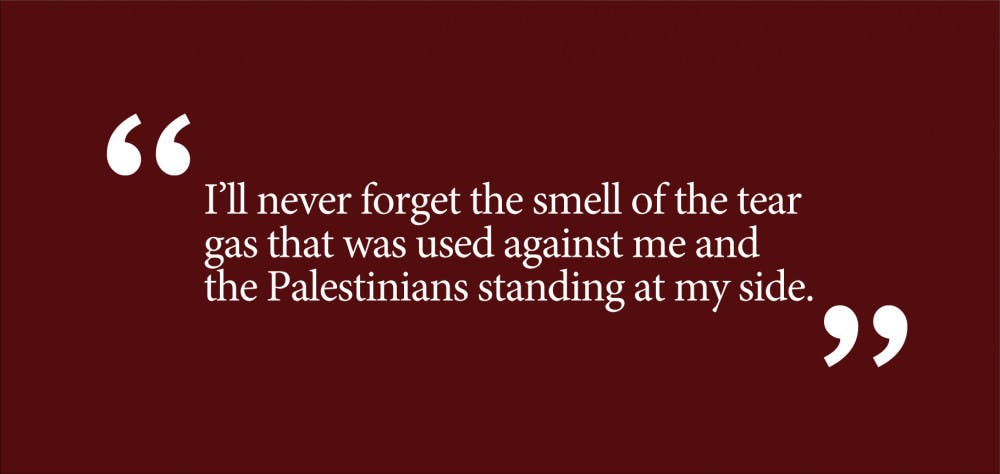Last fall, I watched a livestream of the Whitney Museum filling with smoke. The smoke emanated from bundles of sage burned by members of Decolonize This Place, an activist collective based in New York City advocating for the removal of Warren Kanders ’79 P’23 from the board of the museum. #WarrenKandersMustGo, said Decolonize This Place. The group filled Whitney atrium with sage smoke to symbolize the tear gas that Warren Kanders sells to the Israel Defense Forces, the U.S. Border Patrol and the Egyptian military. Watching the livestream, I was immediately transported back to the Palestinian village where I had smelled the chemical just months before.
Later in the fall, I learned that Kanders is a donor to Brown, where he sponsors the Brown Arts Initiative and sits on the Presidential Advisory Council for the Institute at Brown for Environment and Society. I recalled the tear gas I had smelled, the Palestinian teenagers with guns pointed at them and the olive trees I saw torn from the ground. It’s possible that the very tear gas I encountered had put dollars in Kanders’ pocket — dollars which followed me back to Brown in the form of Kanders’ hypocritical “protest art” exhibit.
Warren Kanders has given dirty money to Brown, and the University has gobbled it up. Kanders sells tear gas that is used to target and harm civilians — potentially including Brown students like me and my Palestinian, Egyptian, Indigenous, and Latin American classmates. Warren Kanders must go.
In my first year at Brown, I started studying Arabic and took one of my favorite courses on Middle Eastern literature. The summer after my junior year, I was lucky enough to get a LINK award from CareerLAB in order to work for +972 Magazine, an online publication based in Tel Aviv. As an intern, I was able to use my video-editing skills, my interest in Middle East politics and my Arabic translation capabilities to produce videos about the Israeli occupation of the West Bank. It was an incredible real-world application of the work I was doing late into the night at the Rock.
As part of my work at the magazine, I went to the B’Tselem archives, where I watched dozens of hours of footage of the IDF arresting children, demolishing homes and evicting Palestinian families. I was horrified by the Israeli government’s treatment of Palestinian civilians in the West Bank, where children are tried in military courts and IDF soldiers help tear olive trees from the ground.
One day after work, another reporter offered to bring me with him to the Israeli-occupied West Bank, where I could shoot some b-roll for my video series. Together we drove along a highway that only Israelis can use, into the occupied territory. In one of the villages we visited that day, there happened to be a protest. Palestinian residents were protesting the IDF bulldozers that had shown up overnight to tear up their village farmland. My colleague and I set up shop across the highway from the protest, looking on and recording footage with the help of some Palestinians from the village.
Suddenly, I saw smoke through my camera lens and started to smell the putrid odor of tear gas. Before I knew what was happening, an Israeli soldier grabbed my camera and cornered me behind an 18-wheeler that was parked along the road. He threw my camera to the ground, grabbed his gun and left me to pick up the pieces. When I walked out from behind the truck, he was pointing his gun at the teenager who had been standing next to me moments before. As a Jewish American, I’m told that Israel exists to protect me. I’ll never forget the feeling of being assaulted by a soldier with a Jewish star on his uniform. I’ll never forget the smell of the tear gas that was used against me and the Palestinians standing at my side.
After months of public demonstrations, Kanders resigned from the Whitney Museum’s board. It became clear that there was no place for someone profiting from tear gas on the Museum’s leadership. The University can and should end its complicity in this violence — it simply chooses not to. When it became clear that the Sacklers engineered and profited from the opioid crisis, Brown rightfully redirected their donations to addiction treatment organizations. What makes Kanders any different?
Tal Frieden ’19.5 can be reached at
tal.frieden@gmail.com. Please send responses to this opinion to
letters@browndailyherald.com and op-eds to opinions@browndailyherald.com.





